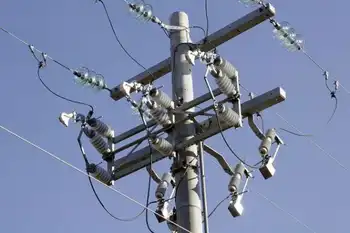Manley named to examine OPG
- Ontario Power Generation is facing a massive cash shortfall of more than $1 billion for this year and next, and that's going to add to the province's deficit, Energy Minister Dwight Duncan said recently. The "monumental mess" at OPG is so serious that the Ontario government named former federal finance minister John Manley to head a committee that will examine the Crown corporation's future.=
"It's astounding how anybody with 80 per cent of the (electricity) production in Ontario . . . can be in the financial straits they're in right now," Duncan said.
The financial problems at OPG, which runs and owns the province's electricity generating stations, will add millions to the province's deficit due to lower revenues, lower taxes and higher borrowing costs, Duncan said.
"There is considerable impact on the books."
Duncan has asked the power generating company's new board to do a full financial and operational audit.
"The future viability of the company is at stake," Duncan said at a news conference, saying the changes the government is announcing will help it "avoid bankruptcy."
"The problems are that bad."
In addition, Duncan named a review committee - headed by Manley - to look at OPG's future role in the province's electricity market, examine its corporate and management structure and whether it should go ahead with fixing the Pickering nuclear power plant.
Other members of the review committee include Scotiabank chairman Peter Godsoe and former federal energy minister Jake Epp.
Epp recently completed a scathing review of OPG's refit of the Pickering plant, which is billions over budget and years behind schedule, and being partially blamed for the current financial woes.
Epp has also been named the chair of OPG's interim board of directors, along with two others.
The board will report back early in the new year on the government's options to fix the financial fiasco at OPG while the review committee will report back by March 15.
Those appointments were criticized by the NDP and the Sierra Club because none of the people have experience running a massive power utility.
Duncan, who found out about the dismal financial outlook from OPG on December 11, said OPG now expects a cash shortfall this year of $350 million.
For 2004, the cash shortfall is expected to be between $300 million and $750 million.
"The problems are growing exponentially," Duncan said. "They don't have cash."
The cash crunch stems from the cost overruns at the Pickering plant, the freeze on electricity rates, and a host of management problems, Duncan said.
The only way this kind of shortfall could occur is if OPG was selling its power below its cost of production, said Tom Adams, executive director of Energy Probe.
Adams suggested that OPG, which dominates the market, kept its prices low so the government's loss due to the price cap of 4.3 cents per kilowatt-hour wasn't too high.
The price cap cost the government $800 million this year.
"I think the reason for that is OPG was manipulating the price for political reasons," Adams said. "There's no business explanation for pricing your product at less than your operating cost."
A lower market price of electricity "kept the previous government from being as strongly criticized as they might otherwise have been," he said. "If people had seen the real cost of power they would have been more alarmed."
Former Conservative energy minister John Baird categorically denied that suggestion.
Instead, Baird blamed the rules set up with the Ontario Energy Board - regulations set up when the Tories opened the electricity market in 2002, where OPG had to give back to consumers any profits made when electricity costs rose above 3.8 cents per kilowatt-hour because of its dominance in the market.
"That obviously has a huge effect on the bottom line, well in excess of $1.5 billion a year," he said.
Duncan said he'll know the real reasons behind the shortfall when the audit and review are completed.
OPG will have to borrow money to cover its costs, and has already sold off receivables for $300 million this year to deal with the shortfall.
For 2004, OPG is now projecting an after-tax loss of $250 million - $100 million worse than expected just a few months ago and $850 million worse than the $600-million profit projection in its 1999 restructuring plan.
Related News

From smart meters to big batteries, co-ops emerge as clean grid laboratories
WASHINGTON - Minnesota electric cooperatives have quietly emerged as laboratories for clean grid innovation, outpacing investor-owned utilities on smart meter installations, time-based pricing pilots, and experimental storage solutions.
“Co-ops have innovation in their DNA,” said David Ranallo, a spokesperson for Great River Energy, a generation and distribution cooperative that supplies power to 28 member utilities — making it one of the state’s largest co-op players.
Minnesota farmers helped pioneer the electric co-op model more than a century ago, pooling resources to build power lines, transformers and other equipment to deliver power to rural parts of the state. Today, 44 member-owned electric co-ops…




